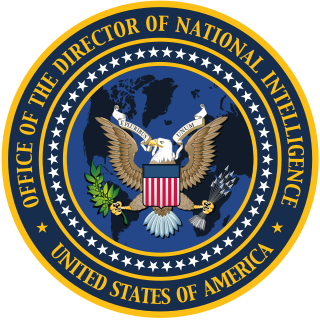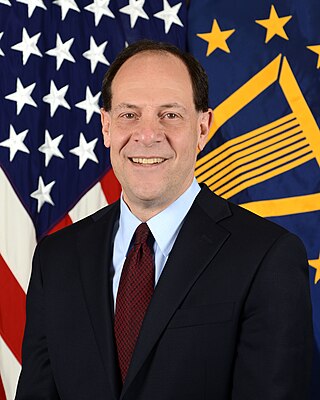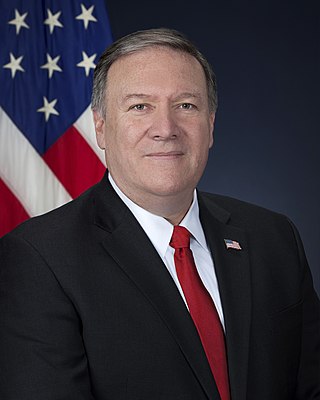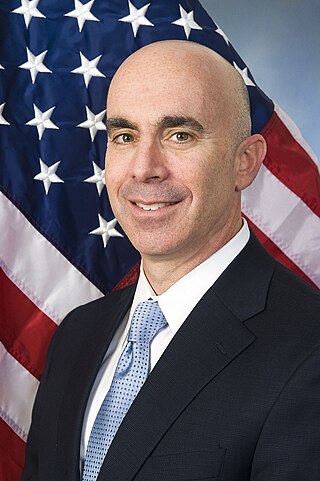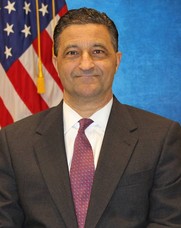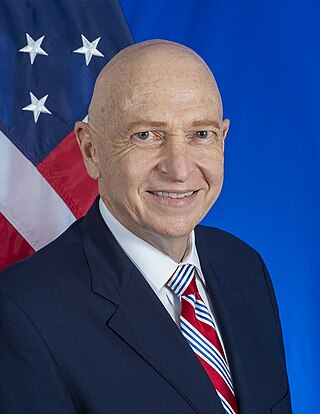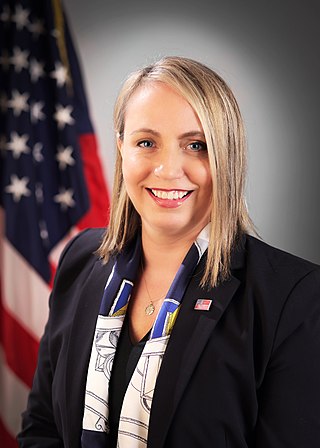Dismissed inspectors general
Intelligence community

On Friday night, April 7, at 10 p.m., Trump sent a letter to Congress saying he intended to dismiss Michael K. Atkinson, the Inspector General of the Intelligence Community, giving as a reason only that he had "lost confidence" in the IG. Trump has described Atkinson as disloyal for his role in forwarding the whistleblower complaint which led to Trump's first impeachment. [16] The dismissal followed a pattern of retaliation against others Trump blamed for aiding the impeachment, including Gordon Sondland and Alexander Vindman. [17] In theory the dismissal becomes effective 30 days after Congress is notified, but Trump placed Atkinson on administrative leave for the 30 days so that in effect the dismissal was immediate. [17]
When Trump was asked about the firing the next day, he criticized Atkinson as having done a "terrible job": "took a fake report and he brought it to Congress", in reference to the whistleblower complaint of the Trump–Ukraine scandal, which was actually largely verified by other testimony and evidence. Trump further complained that Atkinson "never even came in to see me. How can you [forward the complaint] without seeing the person?" Trump concluded that Atkinson was "not a big Trump fan". [18] [19]
Atkinson said in a statement that he was fired for having "faithfully discharged my legal obligations as an independent and impartial Inspector General". [20]
Department of Defense

Glenn Fine was effectively removed from his position as acting inspector general for the Department of Defense on April 7, when Trump named another person to the acting inspector general post. Fine then resumed his role as principal deputy inspector general, a Senate-confirmed post. Fine had been appointed on March 30 to head the Pandemic Response Accountability Committee, an oversight body for funds voted by Congress to deal with the COVID-19 pandemic in the United States, by the Chair of the Council of the Inspectors General on Integrity and Efficiency, as mandated by the Coronavirus Aid, Relief, and Economic Security Act. But only inspectors general can serve on the committee, so that Fine was in effect fired from that role eight days after assuming it. [21] [22] When Trump signed the coronavirus funding bill, he had issued a signing statement challenging the required oversight committee, and said that he personally would take the oversight role and would be in control of what information was sent to Congress about the use of the $2 trillion in relief funds authorized by the bill. [23]
Seven weeks later, on May 26, Fine submitted his resignation as principal deputy inspector general, effective June 1. A Pentagon official said Fine resigned voluntarily and was not pushed out. In a statement Fine gave no reason for resigning but said inspectors general "are a vital component of our system of checks and balances, and I am grateful to have been part of that system. After many years in the DoJ and DoD OIGs, I believe the time has come for me to step down and allow others to perform this vital role." [24] Former defense secretary James Mattis praised Fine, saying "It's regrettable seeing such a highly competent, non-partisan patriot and public servant leaving government service. Mr. Glenn Fine represents all that is noble in taking on the hard work of keeping government honest and responsive. He will be missed." [24]
Department of Health and Human Services

At 8 p.m. on Friday, May 1, it was announced that the White House would nominate a permanent inspector general to replace Christi Grimm, the acting inspector general of the Department of Health and Human Services. Grimm was to return to her regular position as principal deputy inspector general. [25]
Trump had earlier criticized Grimm for signing off on an April 6 report saying that the nation's hospitals were suffering from severe shortages of personal protective equipment and testing supplies. At the time Trump was asked by a reporter about the report, and he said "It's wrong. Did I hear the word 'inspector general'? It's wrong." He also demanded to know the name and history of the IG who produced the report, saying it might have been influenced by politics. [26] [27] Trump continued to insist that there were no shortages. [28] On Twitter, Trump stated that Grimm's report was "Another Fake Dossier", and stressed that Grimm had worked for the Obama administration, even though Grimm had worked for the health inspector general office's since 1999, for two more administrations before Obama's. He also stated at a press conference that the report was just Grimm's "opinion", even after being informed that Grimm's report was based on a survey of 323 hospitals. [29]
Department of State

On Friday, May 15, at 10 p.m., the White House announced that State Department inspector general Steve Linick had been removed. [25] Trump appointed Stephen Akard, the director of the State Department's Office of Foreign Missions, as acting inspector general. [30] The White House said Trump had dismissed Linick at the request of Secretary of State Mike Pompeo. Linick had been investigating whether Pompeo had used government employees to run personal errands for him. [6] In a separate, almost completed investigation, Linick was reportedly looking into whether Pompeo had evaded Congressional limitations on arms sales to Saudi Arabia and the United Arab Emirates by declaring an emergency, even though none existed. [31] A third line of inquiry into Pompeo was his regular hosting of several dozen lavish, taxpayer-funded "Madison Dinners" at the State Department for hundreds of attendees, including many influential business and media figures; there were concerns that Pompeo had been using the dinners to further his own political career (assembling the names and contact information of possible future contributors and fundraisers), rather than for official diplomatic purposes, potentially violating the Hatch Act. [32] [33] [34]
Pompeo defended his recommendation to remove the IG, said he "should've done it some time ago", and dismissed the accusations as "crazy stuff", but he did not provide any justification for the IG removal. [35] He initially said his action could not have been retaliatory because he had not been aware of any of the investigations; however, he later acknowledged that he had provided written responses to one of the IG probes. [36] He faces calls to testify before Congress, even though the White House would likely block such an appearance. [37] [38] On May 22, the Houston Chronicle editorial board said that regarding Linick's dismissal, there is "growing concern it was engineered to derail ongoing investigations" into Pompeo. [39]
In a private interview on June 3 with the House Foreign Affairs Committee and House Oversight Committee, Linick confirmed that prior to his dismissal, he had been investigating allegations of misuse of government resources" against Pompeo and his wife, and had request documents from Pompeo's executive secretary. Linick said that shortly before he was fired, he had sought to interview Pompeo about an "emergency" arms deal with Saudi Arabia, and that a senior State Department official, Stephen Biegun, had repeatedly attempted to "bully" him into stymieing inquiries. [40] Linick told congressional investigators, "I have not heard any valid reason that would justify my removal." [40] The House committees investigating the dismissal are seeking interviews with a number of other high-ranking officials in Trump's State Department. [40] In August 2020 the three committees subpoenaed four State Department officials to testify about Linick's dismissal, saying that the subpoenas were necessary because the State Department had been "stonewalling" their investigation. [41]
In August 2020 Acting Inspector General Akard resigned after less than three months on the job. [42] An internal email said that he was returning to the private sector, and that Deputy Inspector General Diana Shaw would become acting inspector general. [43] On August 31 Pompeo appointed Matthew Klimow, the U.S. ambassador to Turkmenistan, to serve as acting inspector general until the end of 2020. He intends to eventually return to his post in Turkmenistan. The State Department did not announce his appointment but confirmed it after it was reported. [44]
Department of Transportation

Also on Friday night, May 15, it was announced that Mitch Behm, the acting inspector general for the Department of Transportation, would be replaced by another acting inspector general while a permanent inspector general is nominated. [25] Behm returned to his position as deputy inspector general. As acting inspector general, Behm was a member of the Pandemic Response Accountability Committee. [45] House Democrats opened an inquiry into whether Behm's dismissal was related to an ongoing IG investigation of Transportation Secretary Elaine Chao, evaluating claims that she had been giving preferential treatment to the state of Kentucky, [46] where her husband, Senate Majority Leader Mitch McConnell, was running for re-election. [5]
Howard "Skip" Elliot was named acting IG, while retaining his position as head of the Pipeline and Hazardous Materials Safety Administration (PHMSA), an agency within the Department of Transportation. [5] [47] The "dual-hat" arrangement was criticized by the chairs of the House Oversight and Reform Committee, House Transportation and Infrastructure Committee, and Oversight Subcommittee on Government Operations (Carolyn B. Maloney, Peter A. DeFazio, and Gerald E. Connolly, respectively). [47] Maloney, DeFazio, and Connolly wrote that Elliot had an "inherent conflict of interest" since he would simultaneously report to Chao in his capacity as PHMSA administrator while also being responsible for investigating and auditing Chao's office in his capacity as acting inspector general. [47] Elliot said that he would "defer to Deputy Inspector General Behm" on matters involving PHMSA, but made no commitment to "recusing himself from the 13 current investigations and 11 ongoing audits involving the Office of the Secretary." [47] Maloney, DeFazio, and Connolly called upon Chao to reinstate Behm as acting IG and called upon Elliot to resign as PHMSA administration and recuse himself from any investigations involving the Office of the Secretary of Transportation. [47]
